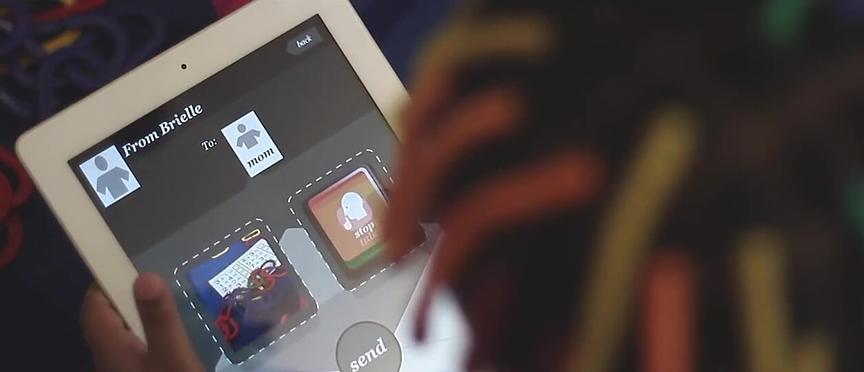Solving An Age-Old Problem
While children are developing crucial life skills at child care or in the classroom, they sometimes struggle to communicate what they did, "at school" to the adults in their lives.
In collaboration with the Carnegie Mellon University (CMU) CREATE Lab, Trying Together (an early childhood nonprofit based in Southwestern Pennsylvania) provided its expertise in child development for the creation, implementation, and delivery of the Message from Me (MfM) technology.
Originally, MfM was designed as a kiosk for children to take a photo with a digital camera and record a message using a microphone to send messages to their family members via the internet. In 2013, the CMU CREATE Lab researchers updated the tool by creating an Apple Software Application (App) for children and educators to send messages through the use of an iPad. Through MfM, parent-child relationships are enhanced, providing a way to more easily document and share what goes on in the classroom and answer the age-old question: "What did you learn in school today?"
What MfM Does
Using the MfM app, a child can record and share daily thoughts and experiences, impacting his or her feelings of individuality, self-confidence, and well-being.
A child who uses MfM also develops skills:
- that help him or her be attentive, cooperative, curious, and persistent;
- that foster taking initiative;
- like artistic expression, English language arts, mathematical thinking, problem-solving, social-emotional, and writing.
Why MfM is Different
In addition, an educator who uses MfM in his or her classroom will have received a minimum of four hours of professional development and has access to a tailored Educator’s Guide and direct, individualized user support. Visual support resources are also available on the MfM administrative website. Since 2012, Trying Together has exclusively provided professional development and support for more than 1,000 teachers who use MfM in their child care centers and classrooms.
Impact on Early Learning and Development
Through the use of MfM, 20,000 children have engaged in consistent communication with their families about their activities. Having now expanded from pre-kindergarten to the lower elementary grades, MfM continues to promote student voice, providing a platform for children to share their unique perspectives. Currently, MfM is used in early learning centers and school districts across Pennsylvania, West Virginia, Utah, Detriot, and in Atlanta Public Schools.
Thanks to the generous support of PNC Grow Up Great, MfM is poised to expand nationwide to PNC's 50+ markets beginning in 2019.
- Impact on Children
Young children enhance their self-esteem and build their confidence when they talk about their day, their accomplishments and their discoveries. MfM offers children the opportunity to talk about their day and grows their language and literacy skills. With MfM, every child has the opportunity to share learning experiences with their family members, which grows conversations in the home about school and classroom activities.
Using MfM in early childhood settings can also improve behaviors in the classroom. With the MfM Educator’s Guide, children and teachers have access to unique ways to achieve goals while directly engaging families in their children’s educational experiences. One teacher expressed that she was able to work together with a child’s parent through MfM.
“I would take photos of the child engaged in appropriate behavior and send the photo and message to this parent. When the parent received the message, she would make a big deal about the photo and how good her child’s day was, focusing on the positive behavior of her child. I really saw changes in the child by using the MfM app.”
- Impact on Families
Using MfM in the early childhood setting allows parents to enhance communication with their children and build stronger connections between the home and school environment. MfM provides a unique method to engage children, teachers, and families in using technology while communicating about the significant experiences during the day. With the integration of MFM, families are receiving more information about their child’s daily activities and classroom learning experiences.
- Impact on Educators
Educators who use MfM report an increased use of appropriate behaviors in the classroom. MfM also supports the use of developmentally appropriate practice (DAP) by educators in early learning settings which improves young children's ability to develop in healthy ways. Additionally, educators who use MfM are able to better engage with children’s primary caregivers and build relationships with them.



